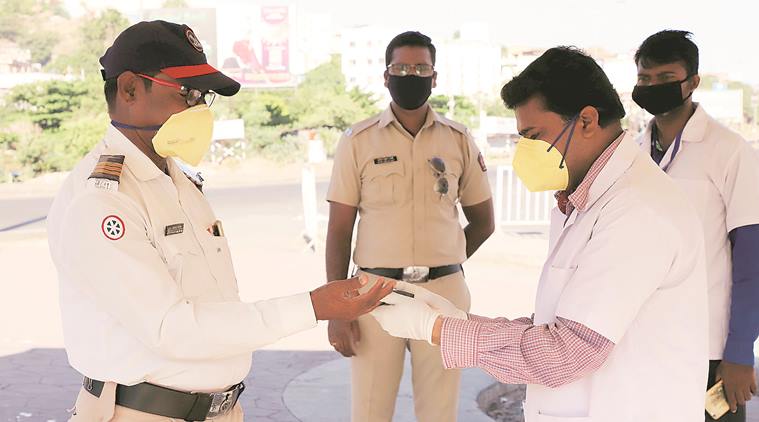 Pune City Police has demarcated over 120 small localities, which police are calling micro-clusters, where curfew measures are being aggressively implemented to contain the spread of infections. (Representational)
Pune City Police has demarcated over 120 small localities, which police are calling micro-clusters, where curfew measures are being aggressively implemented to contain the spread of infections. (Representational)
In densely-populated hotspots of Pune, where aggressive imposition of curfew continues, police teams are going beyond the call of duty to help affected people, and they are being aided by citizen volunteers, NGOs and technology-based solutions.
A large number of densely-populated areas in the centre of Pune, many of which are slum areas, remain some of the worst-affected parts of the city with increasing cases of COVID-19 infections.
Pune City Police has demarcated over 120 small localities, which police are calling micro-clusters, where curfew measures are being aggressively implemented to contain the spread of infections. But, according to officials, narrow lanes, small and densely-placed houses and shanties, common public toilets and overall financial constraints are making it extremely difficult for people to maintain the norms of social distancing in these areas.
While nearly 9,000 personnel of Pune City Police are currently deployed in some COVID-related duty, police units at multiple levels are taking various initiatives beyond the mandated duties to make sure that social distancing is practiced, safety measures are adhered to and weaker sections get adequate aid. These initiatives involve technology-based solutions, coordinating with NGOs and taking help from citizen volunteers who are being called ‘special police officers’ (SPOs).
Across the city, nearly 1,500 SPOs have been helping police in short-span duties during the day. Pune City police have also set up a Social Policing Cell, through which all welfare measures are being coordinated.
Deputy Commissioner of Police (DCP), Zone 3, Pornima Gaikwad said, “An area in our jurisdiction with a population of around 25,000 has reported exponential growth recently. From the time these cases started coming up, we started plotting locations of houses of people who have tested positive. We also plotted locations of public toilets. There was a clear correlation and thus, based on this study, solutions were put in place with the help of health officials. Our teams, through the SPOs, started monitoring regular cleaning, disinfection and fumigation of these toilets. We have also collected information about the shops selling groceries, milk and vegetables in highly-affected areas. These shops are being monitored for maintaining social distancing norms and safety measures.”
DCP (Zone 1) Swapna Gore said, “While our force continues doing lockdown duties on the ground, our teams are also acting as a bridge between people and the organisations, providing sanitiser, safety gear and food packets. In Zone 1, over 150 SPOs are helping us in duties like managing queues at shops and closely monitoring that public toilets are being cleaned and disinfected by the civic staff. With the help of welfare organisations, we have distributed over 11,000 bottles of sanitisers in slum areas and over 7,700 masks. Over a dozen affected clusters are being monitored by SPOs.”
Officials from Zone 2 have also started installing foot-operated public wash basins in their jurisdictions, an initiative which is being followed in other areas now.
DCP (Zone 2) Shirish Sardeshpande said, “A densely-populated area with a population of around one lakh has till now reported over 150 cases. This is an area where houses and alleys are so densely packed that following social distancing norms is a challenge. With the help of volunteers from each alley or set of bylanes, we are making sure that people stay indoors. The volunteers are being given safety gear and also ration packages 15 days at a time, which is a token of appreciation for their service. Foot-operated wash basins are being installed outside public washrooms. Small steps like keeping pieces of newspapers to operate doors of toilets are key to reducing possibility of infections.”
Pune Police Commissioner K Venkatesham said, “In spite of all odds, the morale of the force is very high. For officers like us, it is inspiring to see how policemen and officers on the ground are working hard in high-risk zones, using innovating methods to make lives better while performing their mandatory policing duties. In normal conditions, police are always the ones to respond first, why should that be different in the present scenario?”
What cops have done:
Police units have facilitated distribution of food or ration to 8,42,684 people, including 17,470 commercial sex workers, 1,050 transgenders and 17,046 students, with the help of 163 NGOs
1,047 street-dwellers identified and moved to shelter homes
Digital passes issued to 20,031 persons with serious medical conditions
12,379 migrant labourers moved into 48 centres